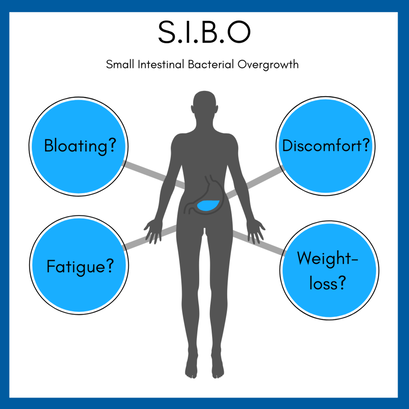 Alison Stewart, is concerned that SIBO goes undiagnosed and can severely impact on the health and wellbeing of sufferers........ Alison Stewart, is concerned that SIBO goes undiagnosed and can severely impact on the health and wellbeing of sufferers........ Alison, accredited practicing dietitian is passionate about many health and diet-related topics, including gut health, microbiome and a little-know about issue called "SIBO". "SIBO" is the acronym for Small Intestine Bacterial Overgrowth which can cause many common gastrointestinal upsets. Alison is passionate about raising awareness about SIBO in the community so she can help more people get well and live more comfortably with better digestive health.
The following information is an extract from an article written by Dr. Nirali Jacobi and referenced from https://sibotest.com/pages/what-is-sibo SIBO is the leading cause of IBS (irritable bowel syndrome). SIBO is a bacterial overgrowth in the small intestine that causes hydrogen, methane and/or hydrogen sulphide gas production. These gases cause the symptoms of IBS but also damage the intestinal wall. Practitioners across the nation are familiar with the frequent presentation of IBS in their clients. IBS can have several causes— food sensitivities, dysbiosis of the large intestine, lack of digestive enzymes or hydrochloric acid, stress. All can cause digestive complaints that are often indistinguishable from one another. SIBO is actually a very common undiagnosed cause of IBS (up to 84%) and thus shares some of the same presenting symptoms with IBS—Gas/bloating, diarrhoea/constipation, and abdominal cramping. Normally, trillions of bacteria are found in the LARGE INTESTINE, where they perform various symbiotic functions for the human body. SIBO is a condition where bacterial overgrowth occurs in the absorptive area of the body the SMALL INTESTINE. Symptoms of SIBO
SIBO can occur when The ileocecal valve (which connects the large and the small intestine) is dysfunctional, allowing large intestinal bacteria to migrate upwards into the small intestine, where they wreak havoc.The normal cleansing wave of the small intestine is disrupted, or stopped. This cleansing wave is called the Migrating Motor Complex (MMC), and occurs approximately every 90 minutes, typically between meals. The function of the MMC is to wash out accumulated bacteria and propel them toward the colon. The MMC is not related to the peristaltic waves of the large intestines. When this function is compromised, the resulting bacteria is allowed to grow and proliferate throughout the small intestine (a little over 6 meters in length). How does SIBO affect you? SIBO causes damage to the absorptive surface of the small intestine - the ability of the body to absorb nutrients from food. The absorptive surface of the small intestine is likened to a shaggy carpet, with finger-like protrusions called villi. The surface of the villi contain microvilli, which act as the interface of absorption—microvilli secrete enzymes called “brush border enzymes” which break starches into single molecules and proteins into single amino acids, so these can be absorbed. SIBO can result in:
Causes of SIBO:
Associated Conditions:
Alison can help assess, diagnose and treat SIBO so get in touch, your tummy will thank you for it!
0 Comments
Your comment will be posted after it is approved.
Leave a Reply. |
Categories
All
|
